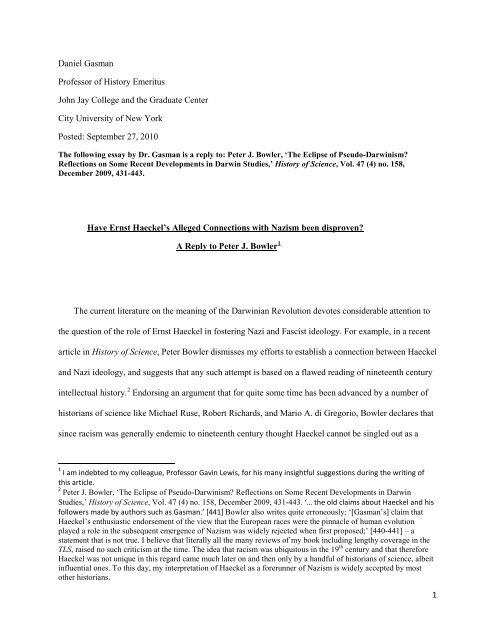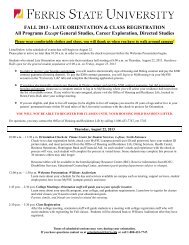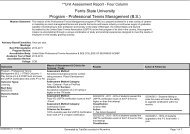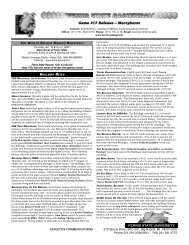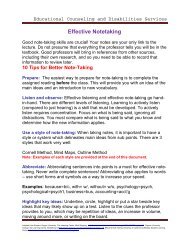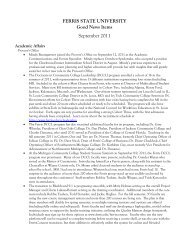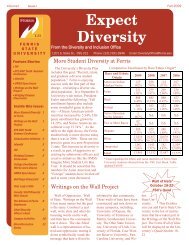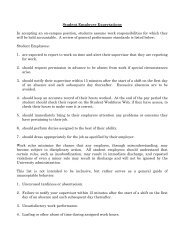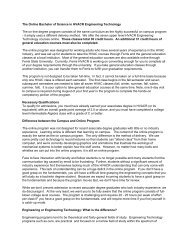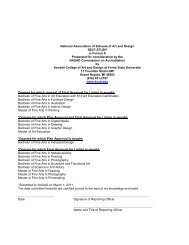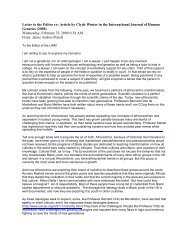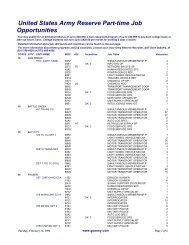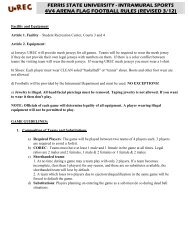Daniel Gasman - Ferris State University
Daniel Gasman - Ferris State University
Daniel Gasman - Ferris State University
Create successful ePaper yourself
Turn your PDF publications into a flip-book with our unique Google optimized e-Paper software.
<strong>Daniel</strong> <strong>Gasman</strong><br />
Professor of History Emeritus<br />
John Jay College and the Graduate Center<br />
City <strong>University</strong> of New York<br />
Posted: September 27, 2010<br />
The following essay by Dr. <strong>Gasman</strong> is a reply to: Peter J. Bowler, ‘The Eclipse of Pseudo-Darwinism?<br />
Reflections on Some Recent Developments in Darwin Studies,’ History of Science, Vol. 47 (4) no. 158,<br />
December 2009, 431-443.<br />
Have Ernst Haeckel’s Alleged Connections with Nazism been disproven?<br />
A Reply to Peter J. Bowler 1<br />
The current literature on the meaning of the Darwinian Revolution devotes considerable attention to<br />
the question of the role of Ernst Haeckel in fostering Nazi and Fascist ideology. For example, in a recent<br />
article in History of Science, Peter Bowler dismisses my efforts to establish a connection between Haeckel<br />
and Nazi ideology, and suggests that any such attempt is based on a flawed reading of nineteenth century<br />
intellectual history. 2<br />
Endorsing an argument that for quite some time has been advanced by a number of<br />
historians of science like Michael Ruse, Robert Richards, and Mario A. di Gregorio, Bowler declares that<br />
since racism was generally endemic to nineteenth century thought Haeckel cannot be singled out as a<br />
1<br />
I am indebted to my colleague, Professor Gavin Lewis, for his many insightful suggestions during the writing of<br />
this article.<br />
2<br />
Peter J. Bowler, ‘The Eclipse of Pseudo-Darwinism? Reflections on Some Recent Developments in Darwin<br />
Studies,’ History of Science, Vol. 47 (4) no. 158, December 2009, 431-443. ‘… the old claims about Haeckel and his<br />
followers made by authors such as <strong>Gasman</strong>.’ [441] Bowler also writes quite erroneously: ‘[<strong>Gasman</strong>’s] claim that<br />
Haeckel’s enthusiastic endorsement of the view that the European races were the pinnacle of human evolution<br />
played a role in the subsequent emergence of Nazism was widely rejected when first proposed;’ [440-441] – a<br />
statement that is not true. I believe that literally all the many reviews of my book including lengthy coverage in the<br />
TLS, raised no such criticism at the time. The idea that racism was ubiquitous in the 19 th century and that therefore<br />
Haeckel was not unique in this regard came much later on and then only by a handful of historians of science, albeit<br />
influential ones. To this day, my interpretation of Haeckel as a forerunner of Nazism is widely accepted by most<br />
other historians.<br />
1
uniquely important figure when measured against his contemporaries and therefore could not personally<br />
have played a determining role in inaugurating the birth of Nazi ideology. 3 The trouble with this<br />
argument is the fact that racism in the nineteenth century did not subscribe to a one-dimensional account<br />
of the composition of society but rather was a multi-delineated ‘scientific’ and ideological doctrine. There<br />
did exist a widespread run of the mill racism that was typical for many scientists and anthropologists who<br />
conceived of humankind as composed of a hierarchy of races, and this is the view that Bowler suggests<br />
was ubiquitous. But there was also a much more radical racism, proclaimed by Haeckel, that not only<br />
stressed racial hierarchy and the supremacy of the white race, but also the special importance and<br />
superiority of the Germans based on an Aryan mythology. It was this radically charged and highly<br />
aggressive form of racism that was forcefully disseminated as scientifically valid by Haeckel and which<br />
ultimately served as an authentication for Nazi doctrine. 4<br />
In addition, it is vital to remember that Aryan racism, as important as it was for the creation of<br />
Nazism, was hardly the only constituent of the ideology. There were a multitude of other significant<br />
facets to this doctrine that can be readily linked to the direct influence of Haeckel and Monism – for<br />
example, Haeckel’s idea that politics is applied biology; his explicit ‘scientific’ support of anti-Semitism<br />
and his demand for the disappearance of the Jewish community in Germany, based on his belief that the<br />
Jews were at the root of the decay of European civilization; his marked insistence on eugenics as<br />
necessary for the racial health of the Germanic community; his ideological influence over the proto-Nazi<br />
völkisch movement; and lastly, his prediction that a racially superior Germany was entitled to supplant the<br />
British Empire on the world stage. It is this comprehensive aspect of the story that Bowler neglects in his<br />
criticism of my analysis.<br />
3 This leads Bowler to accept Richards’ criticism of my work: ‘[Richards] quite rightly points to the fact that almost<br />
all of Haeckel’s contemporaries thought the white race was superior…. At most, one could implicate Haeckel [in<br />
Nazism-dg] by noting the effectiveness of his popularization of Darwinism….’ [440-441]<br />
4 For an account of Haeckel’s influence on the birth of Fascist ideology in Italy, France, and other countries apart<br />
from Germany, see <strong>Daniel</strong> <strong>Gasman</strong>, Haeckel’s Monism and the Birth of Fascist Ideology, New York: Peter Lang,<br />
2008. [1998]<br />
2
In the remainder of his article, Bowler focuses largely on the writings of Robert J. Richards and<br />
Sander Gliboff, 5 with some attention also to the ideas of Richard Weikart, a partisan of Intelligent Design.<br />
Bowler confines himself to an examination of the narrower scientific issues raised by their interpretation<br />
of the nature of developmental models of evolution and their understanding of the meaning of Natural<br />
Selection in Darwin and Haeckel. Bowler is sensitive to the theoretical divide between the biology of<br />
Haeckel and Darwin and criticizes Richards and Gliboff for minimizing or even denying the prevalence<br />
of teleology in Haeckel’s science. He is skeptical as well about Richards’ pet theory that Darwin’s ideas<br />
were fundamentally influenced by German romanticism. But he fails to mention that these authors<br />
conceived their books in large measure as polemics against my evaluation of Haeckel and his ties to<br />
National Socialism. This effort is very pronounced in Richards’ biography of Haeckel 6<br />
and Gliboff states<br />
explicitly, in his book on H.G. Bronn and Haeckel, that his intention is to invalidate my analysis of<br />
Haeckel both in terms of his science and his links with National Socialism. Yet Bowler gives no hint<br />
either of this aspect of Richards’ and Gliboff’s work , or of the controversy between Richards and myself<br />
that has escalated exponentially over the past few years relating to the proto-Nazi content of Haeckel’s<br />
thought.<br />
Bowler treats the question as to why these authors are so keen to revise the content of the<br />
developmental model in Haeckel and to bring Darwin and Haeckel’s understanding of Natural Selection<br />
closer together than has been done in the past as a mere technical problem in the history of science. It<br />
does not seem to have occurred to Bowler that this might, in addition have something to do with denying<br />
the idiosyncratic nature of Haeckel’s science as against that of Darwin as a way of breaking Haeckel’s<br />
links with National Socialism – for since Darwin was not a co-founder of National Socialism, and if<br />
Haeckel was the mirror image of Darwin, he also cannot be burdened with such a grievous liability. And<br />
5<br />
Robert J. Richards, The Tragic Sense of Life: Ernst Haeckel and the Struggle over Evolutionary Thought, Chicago:<br />
<strong>University</strong> of Chicago Press, 2008; Sander Gliboff, H.G. Bronn, Ernst Haeckel, and the Origins of German Darwinism,<br />
Cambridge, Mass: MIT Press, 2008.<br />
6<br />
Richards writes that scholars who adopt <strong>Gasman</strong>’s ideas about Haeckel are historians ‘without scruple.’ Richards,<br />
Tragic Sense of Life, 449.<br />
3
in a broader sense, what escapes Bowler is the crisis in content and understanding of Haeckel’s role in<br />
evolutionary history that has now come to suffuse virtually the entire recent literature on Darwinism. It<br />
appears that an unshakable mythology has taken hold of this field of Darwinian scholarship, and given the<br />
ecstatic reviews that Richards and Gliboff have received from a substantial number of historians of<br />
science, it is worthwhile raising the issue of how fashionable, but often erroneous modes of thought<br />
manage to gain dominance and prosper in ostensibly objective fields of scientific and historical<br />
endeavor. 7<br />
In a number of recently written articles I have pointed out that Richards’ biography and other<br />
8<br />
writings on Haeckel are deeply flawed.<br />
Running throughout Richards’ work are conspicuous<br />
discrepancies between what he suggests Haeckel said and what the sources actually reveal. The main<br />
theme of his book as reflected in the title The Tragic Sense of Life borrowed from the classic book of the<br />
famous Spanish writer and mystic Miguel de Unamuno, is clearly untenable and Haeckel certainly was<br />
not a philo-Semite as Richards urges. Bowler’s failure to mention any of this compels one to examine<br />
more closely Bowler’s understanding of the major books that he has reviewed and to compare that with<br />
the actual content of these works. In addition, it is also necessary to take a critical look at some of the<br />
7 See, for example, the recent review of Richards’ Tragic Sense of Life by Nick Hopwood, ‘Darwinism’s Tragic<br />
Genius,’ Isis, Vol. 100: December 2009, 863-867. Without any proof whatever, and following Richards, Hopwood<br />
dismisses claims that Haeckel can be linked with Nazism and anti-Semitism.<br />
8 See <strong>Ferris</strong>.edu/isar/<strong>Gasman</strong> Controversy; and <strong>Daniel</strong> <strong>Gasman</strong>, ‘From Haeckel to Hitler: The Anatomy of a<br />
Controversy,’ eSkeptic.com, 10 June 2009. The discussion about Richards’ biography that follows is based on a<br />
number of articles that have appeared on the ISAR website and a review of Richards’ biography of Haeckel in<br />
eSkeptic, the Internet edition of Skeptic Magazine. Michael Shermer, the editor of Skeptic Magazine peremptorily<br />
cancelled, on the eve of publication, the hard copy version of the review after receiving complaints from Professor<br />
Richards. Richards voiced his objections to the review in the July 1, 2009 edition of eSkeptic accusing me of being<br />
‘unhinged,’ but not responding substantively to my objections to his work. Professor Richards is a master of<br />
hyperbole; for ‘unhinged’ one should read, one would suppose, being critical. Richards began taking issue with my<br />
work in print as far back as the 1980s but I did not begin to respond in any way until 2004 after the pace of his<br />
attacks on my ideas about Haeckel began to escalate in print and on the Internet and especially after 2007 when<br />
he took steps as a co-editor of the MIT journal Biological Theory to frustrate a response to an article critical of my<br />
work on Haeckel’s anti-Semitism that he published in the same journal. For details of these events, see<br />
<strong>Ferris</strong>.edu/ISAR/<strong>Gasman</strong> Controversy. Appreciation is due to the director of the Institute for the Study of Academic<br />
Racism, Professor Barry Mehler of <strong>Ferris</strong> <strong>State</strong> <strong>University</strong> who demonstrated exceptional intellectual and moral<br />
courage in bringing these core issues affecting current Darwinian literature to the attention of the public. His<br />
Institute has long been in the forefront of the struggle for truth in Academia.<br />
4
literature that has been emanating from the Haeckel Archives at the <strong>University</strong> of Jena – another<br />
important aspect of the story that receives no mention from Bowler.<br />
Not really discussed by Bowler beyond what has been noted is that Richards’ biography promises to<br />
rescue Haeckel from a century and half of disparaging assessments of his biology, and above all<br />
undertakes a refutation of the more recent and widely held belief that he was instrumental in formulating<br />
the basic tenets of Nazi ideology. The common understanding among historians is based on the fact that<br />
Adolf Hitler came of age during the decade and a half following the publication in 1899 of Ernst<br />
Haeckel’s Riddle of the Universe, a runaway best seller that over the next two or three decades sold more<br />
copies internationally than the Bible and profoundly shaped the consciousness of the modern world.<br />
Haeckel’s book imparted a rigid Social Darwinist message purportedly derived from science: politics is<br />
applied biology; the Jews are an inferior race compared with the Aryans and have disturbed the well-<br />
being of European civilization with their transcendental morality based on dualism; Christianity,<br />
instigated by the Jews, is a religion of weakness; and concerted eugenic action is necessary to protect the<br />
racial composition of society.<br />
In his attempt to disentangle Haeckel from Hitler and Nazism, Richards argues that Haeckel was<br />
really a benign political figure with affinities to liberalism rather than to Fascist authoritarianism, and an<br />
intellectual personality infinitely more interested in evolutionary science than in a radical, Nazi-like<br />
reorganization of society. Racist eugenics, anti-Semitism, and extreme Germanic nationalism were really<br />
strains of thought foreign to Haeckel’s beliefs, and Richards claims that Haeckel has been maligned –<br />
especially by me (in The Scientific Origins of National Socialism [1971; 2004]) and Stephen Jay Gould<br />
(in several of his popular essays and in his book, Ontogeny and Phylogeny [1977]) – as having a<br />
pernicious influence. 9<br />
9 Richards, Tragic Sense of Life, 449.<br />
5
These revisionist claims have aroused considerable interest because if what Richards suggests is true,<br />
this would impact not only the history of science, but also a number of other important fields of history<br />
that have been linked to Haeckel in recent years: Nazism, anti-Semitism, the Holocaust, eugenics, and the<br />
social role of science and political ideology. The problem, however, is that a careful reading of Richards’<br />
book uncovers a process of selective quoting and blatant manipulation of evidence to support the author’s<br />
thesis. This is a serious charge against a highly respected historian of science and Darwinian scholar and<br />
one has to disentangle a number of separate strands of thought that run through Richards’ book and<br />
articles on Haeckel in order to grasp how evidence is distorted so that more often than not only a<br />
fictionalized figure emerges, unrecognizable from what is commonly known about Haeckel and his<br />
science and philosophy.<br />
For much of his academic career Richards has been on a self-declared quest: to reconcile any<br />
perceived differences between Haeckel and Darwin and to establish that Darwin created his evolutionary<br />
theories from the same sources in German romanticism that determined Haeckel’s evolutionary science.<br />
Richards insists over and over again that ‘[Haeckel’s] theoretical convictions hardly differed from those<br />
of Darwin’ and that German Darwinismus was interchangeable with the familiar patterns of English<br />
science; Haeckel, in other words should vanish as an idiosyncratic scientist and thinker and English and<br />
German Darwinism should be seen as a unified theoretical and scientific movement. 10<br />
Haeckel did not have a Tragic Sense of Life<br />
For Richards, Haeckel was guided by a tragic sense of life, bearing great similarities to the religious<br />
philosophy expounded by Unamuno. ‘Unamuno offers a clue, I believe, for the solution of the puzzle of<br />
Haeckel…. Unamuno explored what he took to be the soul-splitting experience of Western intellectuals,<br />
their tragic sense of life. He depicted the struggle of a skeptical reason, especially in philosophy and<br />
10 ‘Darwin [can] be accounted an Haeckelian;’ Richards, Tragic Sense of Life, 72. Or, as Richards writes further on:<br />
‘The history I have sketched … indicates that Haeckel not only drew on many of the same sources that formed<br />
Darwin’s own conceptions, but more importantly, that beneath the distinctively Germanic outer layers, the core of<br />
his evolutionary morphology was the same as the Englishman’s;’ 119, n.15.<br />
6
science, as courageously insisting that human striving is mortal, that its efforts end in the grave; yet such<br />
reasoning, cannot, he thought, overcome the vital desire for life, for transcendence,’ so that reason and<br />
life are fundamentally at odds with each other. Richards thus proclaims that his ‘overarching argument<br />
will be that Haeckel’s science and his legacy for modern evolutionary theory display the features they do<br />
because of his tragic sense of life.’ 11<br />
The trouble with this exegesis – apart from Richards’ obvious failure to define exactly what<br />
transcendence might have actually signified for both writers – is the fact that Unamuno for the most part<br />
conceived his book as an attack on the scientific Monism of Haeckel, which he correctly understood to be<br />
12<br />
the implacable enemy of Christian transcendence. In The Tragic Sense of Life – and this is not<br />
mentioned by Richards – Unamuno denounced Haeckel 13 in the strongest possible language, and he<br />
decried Haeckel’s Monism as a faulty, unsatisfying, and materialistic philosophy because it denied the<br />
immortality of the soul: ‘Every monist system will always seem materialist,’ hence deficient, Unamuno<br />
declared. Rather, ‘only dualist systems preserve the immortality of the soul, only those systems which<br />
teach that human consciousness is something substantially distinct and different from other<br />
manifestations of phenomena.’ 14 Therefore, ‘monist tricks are of no use to us. We want the substance, not<br />
the shadow of eternity!’ 15<br />
It is anybody’s guess how this explanation by Unamuno of the dualistic<br />
meaning of transcendence, his anguished evocation of the tragic sense of life, and his unconditional<br />
rejection of scientific Monism and pantheism, can be reconciled with Richards’ account of Haeckel’s<br />
quest for transcendence that runs parallel to the religious devotion of the Spanish philosopher.<br />
11 Richards, Tragic Sense of Life, 10, n.31. In his biography of Haeckel, Richards confuses Haeckel’s experience of<br />
tragedy i.e., the unexpected and premature death of his first wife, with a tragic sense of life, an outlook on life<br />
which Haeckel did not subscribe to. Nor can it be shown that any of Haeckel’s scientific theories were influenced<br />
by a tragic sense of life which Richards incorrectly has suggested as a determining theme in Haeckel’s work.<br />
12 Unamuno published his book early in the twentieth century, at a time when Haeckel’s monism had achieved<br />
overwhelming prestige symbolized by the famous International Monist Congress held in Hamburg in 1911.<br />
13 Unamuno was hardly complimentary towards Haeckel: ‘There is no point in talking of the indecencies of Haeckel,<br />
that master of incomprehension;’ ‘[Haeckel] harbor[s] the pretention of disdaining theology [and] has succeeded<br />
[only] in dissipating the enigmas of nature.’ Unamuno, Tragic Sense of Life, Princeton: Princeton <strong>University</strong> Press,<br />
1972, 106, 258.<br />
14 Ibid, 89-90.<br />
15 Ibid, 53.<br />
7
The truth of the matter is that Richards seems uncomprehending of the central ideas contained in<br />
Unamuno’s remarkable philosophical essay. Impressed by the cultural impact of the Darwinian revolution<br />
and modern science in general, Unamuno was concerned about the loss of meaning in life and the<br />
undermining of the traditional religious source of faith and ethics brought on by the triumph of Positivism<br />
in the nineteenth century. As a religious thinker, Unamuno suggested that ultimately human life could<br />
only be sustained by non-rational Christian faith. For Unamuno it was the tragedy occasioned by the<br />
contradiction between the impersonal findings of science and its candid recognition and acceptance of<br />
death, on the one hand, and, on the other hand, the human need for concrete physical immortality, and for<br />
a transcendent humanistic faith and adherence to ethical values that of necessity had to be sustained<br />
devoid of scientific and rational authority – an unresolved dilemma that fuels the tragic sense of life<br />
confronting modern man as Unamuno describes it.<br />
But for Haeckel, despite what Richards insists no such contradictory tragedy exists for modern man.<br />
Haeckel embraced death and the meaninglessness of human existence and rejected any belief in<br />
transcendent faith. Death in the Christian sense that Unamuno believed in was not to be defeated by<br />
spiritual transcendence, but was rather to be embraced as the evolutionary source of new life. For<br />
Haeckel, awareness of death was not a tragedy, but only a necessary part of the struggle for existence and<br />
evolution. Despite what Richards contends, therefore, Haeckel’s position on transcendence and his<br />
rejection of all its forms, was the direct opposite of what Unamuno believed and proclaimed in his classic<br />
text.<br />
Furthermore Haeckel, despite what Richards urges, did not believe, with Unamuno, that reason is the<br />
enemy of life, nor could Haeckel have accepted Christian-like transcendence because his Monism was<br />
8
totally committed to a philosophy of immanence. In short, Richards’ analysis bears no relation to the<br />
Monism of Haeckel, nor does seem to fully understand the thought of Unamuno. 16<br />
Furthermore, one should bear in mind that a tragic sense of life implies some aspect of non-<br />
fulfillment; that, for example, the attainment of absolute knowledge is forever impossible and therefore<br />
human beings can never realize certainty in life, especially over questions of morality and the tragedy of<br />
human mortality. But Monism is the opposite of a tragic sense of life, because Monism implies total<br />
fulfillment based on the absolute reconciliation of opposites. Haeckel therefore would have rejected<br />
Unamuno’s concerns. In Haeckel’s 1899 magnum opus, The Riddle of the Universe, the theme clearly<br />
advanced was that knowledge was not limited. On the contrary, for Haeckel, all the riddles of the universe<br />
had been or were on their way to being solved. Nothing lay beyond the ability of science to comprehend<br />
the complete structure of the cosmos. Thus, the aspect of tragedy that Richards assumes in Haeckel is<br />
simply not there.<br />
Haeckel and Darwin<br />
A critical theme in Richards’ book emphasizes that the distinctions that are conventionally drawn<br />
between the science and biology of Darwin and Haeckel are misplaced and that the two scientists are<br />
really interchangeable intellectual figures. Richards believes that when correctly analyzed, Darwin is<br />
actually a Haeckelian and that his biology draws upon the same sources and closely resembles the science<br />
of Haeckel. However, even if one were to admit that there were some common romantic sources in the<br />
16 Richards incorrectly transforms Unamuno into a pantheist in order to show his affinity with Haeckel: ‘Unamuno<br />
argued that the desire for immortality, the longing to unite with eternal, divine nature….’ Richards, Tragic Sense of<br />
Life, 453. But Richards’ explanation is absolutely untenable and demonstrates how the primary theory of his book<br />
is built on a foundation of sand. Immortality for Unamuno was conceived in a Catholic sense, meaning a hoped for<br />
immortality of the concrete, physical person. As Unamuno wrote in opposition to Monism: ‘No, I do not long to be<br />
submerged in the great All, in infinite and eternal Matter and Energy, or in God. I long to possess God, not to be<br />
possessed by Him, to become myself God without ceasing to be the I who now speaks to you.’ Unamuno, Tragic<br />
Sense of Life, 52-53. On Unamuno’s interest in but ultimate rejection of pantheism, see Armand F. Baker, ‘The God<br />
of Miguel de Unamuno,’ Hispania, 74(3) December 1991, 824-833.<br />
9
scientific theories of Darwin (and this is probably not the case), there remain vast differences between the<br />
two men and Richards’ suppositions are unsupported by the available evidence.<br />
As has been frequently observed, Haeckel’s biology assumed the reality of determining forces within<br />
nature, a position remote from Darwin’s theory of natural selection. 17<br />
Furthermore, it should be borne in<br />
mind that Darwin did not offer a comprehensive philosophy of life, as Haeckel did. As early as the<br />
writing of the Generelle Morphologie in 1866, Haeckel presented his evolutionary theory combined with<br />
his philosophy of Monism, suggesting that evolution was not just a theory about the development of life<br />
and the creation of new species, but a total explanation of the meaning of life. This was very different<br />
from what Darwin offered in The Origin of Species, which was simply an explanation for evolution.<br />
Monism dominated Haeckel’s science and philosophy for the rest of his life, but disturbingly, Richards<br />
takes great pains to gloss over this fact as much as possible, uncritically integrating Haeckel’s religious<br />
ideas into his science.<br />
In all other major areas as well, a vast chasm separates the two men. Darwin did not suggest that<br />
spontaneous generation had been empirically verified, as Haeckel did. Darwin did not proselytize on<br />
behalf of an evolutionary secular religion that would replace Christianity, nor did Darwin believe in the<br />
existence of a world soul, or in pan-psychism or display a predilection for magic or theosophy, all of<br />
which Haeckel did. Darwin did not articulate a comprehensive plan of racial eugenics for the regeneration<br />
of society, nor was Darwin an anti-Semite, believing that the Biblical tradition was at the root of the<br />
weakness of European civilization; nor was Darwin an opponent of liberalism. Haeckel was absolutely<br />
insistent in his support of the existence of the Aryan race and he explicitly lent his scientific authority to<br />
the racial-historical theories of Count Gobineau, hardly a view of the world to which Darwin would have<br />
subscribed. Darwin was quite probably a sympathizer with Abolitionism,<br />
17<br />
See Jacques Roger, ‘Darwin, Haeckel et les français,’ in Yvette Conry (ed), De Darwin au Darwinisme, Paris: Vrin,<br />
1993, 149-165.<br />
18<br />
See Adrian Desmond and James Moore, Darwin’s Sacred Cause: How a Hatred of Slavery Shaped Darwin’s Views<br />
on Evolution, Boston: Houghton Mifflin, 2009. For Haeckel’s derogatory views about the ‘inferiority’ of Africans,<br />
18<br />
but Haeckel believed in the<br />
10
intrinsic inferiority of the African peoples that was frozen in their biology and employed highly charged<br />
derogatory language about Africans that would have been abhorrent to Darwin despite his own racial<br />
prejudices. The obvious reality is that Haeckel’s Darwinism with its emphasis on an idealistic<br />
morphology and a vitalistic worship of nature represents an intellectual and ideological universe totally<br />
apart from that of Charles Darwin. Richards’ attempt to draw parallels between English and German<br />
Darwinism represents a distortion that journeys way beyond the parameters of plausible historical<br />
evidence and analysis.<br />
In stirring language, Richards glorifies the romantic strain in both Haeckel and Darwin, as if to say<br />
this mode of thought was scientifically and philosophically fruitful. But, as is generally conceded,<br />
Haeckel’s science ultimately collapsed by the end of the nineteenth century, and that the real weaknesses<br />
of Haeckel’s biology resided in the fact that he borrowed too heavily from the tradition of German<br />
romanticism. Richards himself endorses this interpretation of nineteenth century evolutionary history, and<br />
thereby presents historians of science with a serious conundrum: if Haeckel’s science was in fact shaped<br />
by romanticism and ultimately failed as a consequence, what is the point of idolizing his romantic<br />
approach to investigating the structure of the organic world? And was it, in the end, not the resemblance<br />
of the two men, but rather Haeckel’s over reliance on romanticism that clearly distinguished his science<br />
from the non-romantic science of Darwin?<br />
Haeckel and ‘Scientific’ Secular anti-Semitism<br />
Richards insists that Haeckel has been misrepresented as an anti-Semite, and that in fact Haeckel<br />
stood out as a friend the Jewish community in Germany. However, Richards is only able to arrive at his<br />
see for example, Ernst Haeckel, Eternity: World War Thoughts on Life and Death, Religion, and the Theory of<br />
Evolution, New York: Truth Seeker, 1915, 166.<br />
11
denial of ‘Haeckel’s alleged anti-Semitism’ by an egregious manipulation of evidence, including<br />
indiscriminate omission of incriminating material and by offering what can only be described as<br />
fantastical interpretations of passages from Haeckel’s writings dealing with the Jews.<br />
Richards’ allegation of a ‘tendentious charge of anti-Semitism by <strong>Gasman</strong>,’ 19<br />
demonstrates a<br />
disturbing lack of knowledge about German history and the history of modern anti-Semitism in general. It<br />
excludes from consideration the emerging school of ‘scientific’ secular anti-Semitism of which Haeckel<br />
was a founding father and a guiding light. He does not understand that so-called ‘scientific’ anti-<br />
Semitism was much more lethal and prophetic of National Socialist ideology than purely religious<br />
traditional antagonism to the Jews. In my book, Haeckel’s Monism and the Birth of Fascist Ideology<br />
(1998, 2008) the discussion of the Monist writings of the important French proto-Nazi authors Jules<br />
Soury and Georges Vacher de Lapouge – both translators into French of some of Haeckel’s major<br />
writings and close disciples of Haeckel – make clear that the ideological foundations of National Socialist<br />
anti-Semitism can be directly traced back to the specific influence of Haeckel. Richards does not mention<br />
this material, because he is determined to omit historical sources that might undermine his fallacious<br />
denial Haeckel’s antagonism toward the Jews and connections with National Socialist ideology in<br />
general.<br />
In his remarks in 1893 to the Monist literary critic Hermann Bahr in an interview on the Jewish<br />
20 21<br />
question, Haeckel declared the ‘Jewish Problem’ to be a ‘racial question,’ extolled anti-Semitism as a<br />
politically creative force, justified its historical role and held the Jews alone responsible for its<br />
19<br />
Richards, Tragic Sense of Life, 273.<br />
20<br />
See ‘Rejoinder Three’ for a discussion of the Hermann Bahr Interview with Haeckel about the Jews: Internet<br />
Posting; <strong>Ferris</strong>.edu/ISAR/<strong>Gasman</strong> Controversy<br />
21<br />
The fact that Haeckel defined the ‘Jewish Problem’ as a ‘racial problem’ in the Bahr Interview, or in The Riddle of<br />
the Universe, [328] and wrote that the ‘characteristics which distinguish [Christ’s] high and noble personality and<br />
which give distinct impress to his religion are certainly not Semitical; they are rather features of the higher Arian<br />
[sic!] race,’ do not discourage Richards from insisting that Haeckel did not speak of the Jews in racial terms. See<br />
Richards, Tragic Sense of Life, 504 n. 15: ‘There is simply no reason to believe Haeckel to be racially anti-Semitic, as<br />
several historians have assumed.’ When challenged, however, Richards will admit that Haeckel was a racist. See his<br />
response in the TLS [9/26/08] to my letter in the same journal [9/10/08] pointing to his distorted reporting of the<br />
content of the Bahr Interview.<br />
12
appearance, and he demanded that the Jews forsake their religious identity and disappear from German<br />
life as a separate community – that hardly establish the philo-Semitism that Richards claims to have found<br />
in the interview. 22<br />
On a number of occasions I have urged Richards to take into consideration the entire text of the<br />
Hermann Bahr interview but to no avail; he continues to justify using only a tiny portion of the interview<br />
for his analysis and taking the passages selected out of context, in this way continuing to misrepresent<br />
Haeckel’s position and general significance for the nature and history of the Jewish question in<br />
23<br />
Germany.<br />
In addition to his failure to adequately convey the full content of the Bahr Interview, Richards, in all<br />
of his writings, demonstrates great difficulty in grasping the clearly anti-Semitic content of Haeckel’s<br />
magnum opus, The Riddle of the Universe. Richards contends that in this work Haeckel devoted only a<br />
few brief passages to the Jews and much more space to attacking Christianity which he claims shows that<br />
Haeckel was hardly concerned with the Jews. But to Haeckel, Christianity was a nefarious invention of<br />
Judaism and Haeckel conflated both religions as ‘Dualism.’ Richards fails to understand that The Riddle<br />
of the Universe advanced a theory of history that would become a fundamental assumption of Monism.<br />
The supposed decline of European civilization, Haeckel contended, stemmed from the time of the birth of<br />
the monotheistic religions and this unfortunate state of affairs, placed primary responsibility on the<br />
22<br />
See my three ‘Rejoinders’ to Richards mentioned above and posted on the Internet that directly challenge<br />
Richards’ interpretation of the Bahr Interview.<br />
23<br />
Richards, Tragic Sense of Life, 506. Richards’ distorted reading of the Bahr Interview has spilled over into a<br />
number of his other articles and Internet postings. I have dealt at length with some of the issues that he raises in<br />
my papers that have appeared in the collection entitled ‘<strong>Gasman</strong> Controversy’ that have already been referred to.<br />
However, it should be reiterated that Haeckel was a major spokesman for the idea of Aryan supremacy based on<br />
‘scientific’ evidence and was a major theoretical influence internationally among the leading founders of so-called<br />
‘scientific anti-Semitism’ – for example, Wilhelm Marr, Heinrich Pudor, Raoul H. Francé, Jules Soury, and Georges<br />
Vacher de Lapouge and many others. These facts are never mentioned by Richards, and his entire analysis of<br />
Haeckel and anti-Semitism is written outside the boundaries of acceptable historiographical norms. See Robert J.<br />
Richards, ‘Haeckel’s Alleged Anti-Semitism and Contributions to Nazi Biology,’ Biological Theory 2(1) 2007, 97-103;<br />
‘That Darwin and Haeckel were Complicit in Nazi Biology,’ in Ronald L. Numbers (ed), Galileo Goes to Jail and other<br />
Myths about Science and Religion, Cambridge, Mass: Harvard <strong>University</strong> Press, 2009; 170-177; and ‘Ernst Haeckel<br />
(1834-1919),’ in Michael Ruse (ed), Evolution: the First Four Billion Years, Cambridge, Mass: Harvard <strong>University</strong><br />
Press, 2009, 626: ‘[<strong>Gasman</strong>] ignored Haeckel’s philo-Semitism, an attitude quite unusual for the period.’<br />
13
shoulders of the Jews for their dualistic religious ideas and for Judaism’s offshoot, Christianity. The Jews,<br />
Haeckel argued, were a separate biological race, both different from and yet as powerful as the Aryans,<br />
and their existence had corrupted the course of evolution and had diverted the world historical process<br />
away from the healthy Monist foundations of ancient pre-Socratic civilization and culture. Such ideas<br />
helped to establish a critical framework of ideas for an understanding of world history that was adopted<br />
later on by the Nazi leadership, most especially by those in the SS who actively instigated and carried out<br />
the Holocaust – for example, leading individuals like Josef Mengele. According to this understanding of<br />
history, the problem of the Jews was not a religious question, but an evolutionary problem and that a<br />
study of the history of biology and science revealed that there was a titanic struggle underway within<br />
evolutionary biology between the destructive racial force of the Jews and the healing power of the Aryan<br />
race. Haeckel and close Monist followers like Jules Soury and Georges Vacher de Lapouge, did much to<br />
set the stage for the proliferation and development of such ideas. 24<br />
Richards’ ‘Moral Grammar’<br />
Richards concludes his book with a reprinted lecture: ‘The Moral Grammar of Narratives in the<br />
History of Biology – the Case of Haeckel and Nazi Biology.’ Richards attaches great importance to this<br />
essay, believing it to provide a foundation for his belief that the connection between Haeckel and National<br />
Socialism is an illusion that stems from manipulated historical sources, and not at all a reflection of<br />
historical reality in the decades around the turn of the twentieth century. Haeckel, he argues, has to be<br />
evaluated not in absolute moral terms, but in regard to the ethical context of his own times.<br />
However, Richards is unable to show that moral consciousness was substantially different a little over<br />
a century ago in Germany, a country situated at the very heart of European civilization, from what it is<br />
today. Richards unjustifiably treats the late nineteenth and twentieth century, the period when Haeckel<br />
24<br />
For an extended discussion of the ideas of Soury and Lapouge, see <strong>Gasman</strong>, Haeckel’s Monism and the Birth of<br />
Fascist Ideology.<br />
14
was politically and scientifically active, as a remote historical period when in fact it is part of the<br />
contemporary world.<br />
Richards also undertakes a historiographical excursus that challenges the sensibilities of even<br />
hardened readers, decrying the writing of history in general as an exercise in manipulation as far back as<br />
Herodotus and Thucydides, and eventually ending up with a denunciation of historians like myself who,<br />
by linking Haeckel with National Socialism, – and presumably inspired by the famous Greek authors –<br />
have ‘caus[ed] sputtering convulsions’ 25<br />
because of a deceptive narrative of historical causality.<br />
What Richards overlooks is that Haeckel and his followers had a lot to say about ethics and morality.<br />
They were not passive onlookers of the society in which they lived, as Richards seems to suggest, but<br />
they constantly talked and wrote about the need to break down conventional religious moral standards in<br />
the light of the discoveries of evolutionary science. The Monists celebrated the defeat of Judeo-Christian<br />
ethics in the name of the struggle for existence and the demands of evolution, a discussion that would<br />
figure so poignantly in the writings of Friedrich Nietzsche and the cultural tragedy he felt coming with the<br />
death of God. By neglecting to point this out, Richards succeeds in casting Haeckel and the Monists in<br />
ahistorical terms as purveyors of conventional morality. Haeckel, however, was constantly at war with the<br />
traditional beliefs of European civilization, hoping to revolutionize the very ethical basis of society.<br />
Richards’ admonitions about the need for the historian to evaluate individuals in terms of the moral<br />
standards of their own society are completely beside the point.<br />
27<br />
Richards accuses historians who criticize Haeckel of distorting evidence by ‘cutting quotations,’<br />
he provides no examples. This is an unfounded accusation because it is Richards himself who is doing all<br />
the ‘cutting’ of relevant sources. For example, earlier in his text, he discusses a book that Haeckel wrote<br />
25 Ibid.<br />
26 Ibid, 500.<br />
27 The full sentence reads: ‘The historian can orchestrate outrage – as some dealing with Haeckel have – by cutting<br />
quotations into certain vicious shapes, selecting those that appear damaging while neglecting those that might be<br />
exculpating.’ Richards, Tragic Sense of Life, 500.<br />
26<br />
but<br />
15
during the First World War, Eternity, excising all the National Socialist-like statements. Richards<br />
misleadingly presents Haeckel as simply a tragic world weary figure, a detached victim of the war, rather<br />
than a bitter, politically motivated extreme nationalist lamenting the looming defeat of the German<br />
Empire. Omitted by Richards are racial alarms raised by Haeckel of racial catastrophe occasioned by the<br />
Allied armies’ use in European warfare of African and Asian troops. ‘Deep students of ethnology and far-<br />
sighted statesmen point with anxiety to the grave consequences that are sure to follow this<br />
“fraternalization” of all the races both to England herself and the supremacy of the white race as a whole.’<br />
The Allies were tragically oblivious to the fact that the ‘cultural and psychological differences that<br />
separate the highest developed European peoples from the lowest savages are greater than the differences<br />
that separate the savages from the anthropoid apes.’ 28 After the armistice in November 1918, Haeckel,<br />
obsessed with racial concerns and reflecting a long tradition in Monist eugenics about the threat posed to<br />
Europe by the exponential growth of the population of the East, complained in a letter to a soldier at the<br />
front that he ‘feared that the greatly longed for peace will result in a full reversal of modern culture. Our<br />
laughing heirs will apparently be the yellow Mongolians.’ 29<br />
Richards rejects my evaluation (along with that of other historians) of Haeckel and the Nazis, because<br />
he claims we advance a ‘mono-causal’ theory. ‘I have objected,’ Richards writes, ‘to the ways in which<br />
these historians have attempted to link Haeckel with the rise of the Nazis and the actions of Hitler in<br />
particular. They have not, for instance, properly weighed the significance of the main other causal lines<br />
that led to the doctrines of National Socialism – the social, political, cultural, and psychological strands<br />
30<br />
that many other historians have emphasized.’<br />
But this criticism of Richards is invalid and is advanced to deflect attention away from Haeckel’s<br />
Nazism. It is not that there has been a failure to take into consideration additional contributing factors in<br />
28<br />
Ibid, 107.<br />
29<br />
Quoted in <strong>Daniel</strong> <strong>Gasman</strong>, The Scientific Origins of National Socialism, New Brunswick: Transaction Press, 2004,<br />
25.<br />
30<br />
Richards, Tragic Sense of Life, 507-508.<br />
16
the rise of National Socialism, but rather that the more conventional explanations have, on the whole, not<br />
been successful and have fallen frequently by the wayside after the discovery of new information. The<br />
explanations for the rise of National Socialism and Fascism apart from emphasis on Haeckel have had a<br />
tendency to break down and this has occurred many times. On the other hand, the connection of Haeckel,<br />
National Socialism, and Monist science continually yields more meaningful theoretical results and this<br />
approach is confirmed by the latest scholarly research. 31<br />
In the very last paragraph of his book Richards reveals how little he grasps about the connection<br />
between Haeckel and Nazism. Richards suggests that in the end the Nazis borrowed just a few lines from<br />
the eugenic literature of Monism and nothing more; and that, in fact, Haeckel was totally rejected by the<br />
32<br />
Nazis. In other words, the substance of Nazism has nothing to do with Haeckel’s Monist program. Such<br />
statements bear no relation to a much more complex and contrasting historical truth about the very real<br />
connection between Haeckel and Hitler.<br />
Sander Gliboff on Haeckel<br />
There is a palpable resemblance between the shortcomings noted in Richards’ writings and the<br />
analysis of Haeckel offered by Sander Gliboff in his book on H.G. Bronn and Haeckel that runs along<br />
similar, but equally misleading paths. The book uncannily reflects a retrogressive materialistic-<br />
positivistic outlook that used to be fashionable in East German accounts of Haeckel, and a synthetic mode<br />
31 Though it would have appeared too late for Richards to have cited it, the catalogue for the remarkable exhibition<br />
during the summer of 2008 at the Montreal Museum of Fine Arts demonstrated the critical role that Haeckel and<br />
Monism played in the elaboration of twentieth century totalitarian art. If Richards’ summary of the thought of<br />
Haeckel were correct, such an exhibition would have been inconceivable. See Jean Clair (ed), The 1930s: The<br />
Making of the ‘New Man,’ Ottawa: National Gallery of Canada, 2008.<br />
32 Richards, Tragic Sense of Life, 453. ‘Yet Haeckel, I believe, would have rejected the vulgar and dogma-driven<br />
Nazis, just as they rejected him.’ But many Nazis especially in the scientific community and the SS enthusiastically<br />
embraced his racial and eugenic ideas and programs. Contrary to Richards’ assertions, the Third Reich did not<br />
reach an official consensus regarding Haeckel.<br />
17
of ‘progressive – German nationalistic’ thought that still continues to attract enthusiastic adherents long<br />
after the fall of the Berlin Wall. Gliboff claims that the idealistic tradition in German nineteenth century<br />
biology is much more illusion than reality; that Haeckel in fact was a mechanistic materialist and an<br />
opponent of determinism and mysticism; 33 that there was a virtual identity between the science of Darwin<br />
and Haeckel and that Haeckel’s science was fully integrated into the rational empirical tradition; and that<br />
the notion of Haeckel as a major source for National Socialist ideology is based on a deeply flawed<br />
reading of his work as pervaded by mysticism. 34 In making these claims that frequently echo the<br />
misconceptions of Richards, 35 Gliboff pays little attention to the idealistic details of Haeckel’s science<br />
and his Monist philosophy 36 and adds a slew of unproven assertions and ignores vast swaths of material,<br />
including both the actual writings of Haeckel as well as the fruits of recent scholarly research into the<br />
intellectual history of fin de siècle culture. 37<br />
One would find in the overwhelming amount of material that<br />
33 Just as Richards launched his biography of Haeckel based upon the false premise of a tragic sense of life, Sander<br />
Gliboff initiates his book with an untenable declaration that Haeckel rejected determinism and teleology in his<br />
science and philosophy. In fact, the very opposite is true. As Haeckel noted: ‘The great struggle between the<br />
determinist and the indeterminist … has ended today in favour of the determinist.’ Or: ‘there is no such thing as<br />
chance.’ Ernst Haeckel, The Riddle of the Universe, London: Watts, 1931, 106, 224. Throughout his professional life<br />
Haeckel always emphasized that he was absolutely committed to determinism.<br />
34 Gliboff, Bronn, Haeckel, 24. Rejecting the Sonderweg theory of German history which attempted to account for<br />
the rise of National Socialism as a consequence of the anti-liberal path followed by Germany in the nineteenth<br />
century, Gliboff offers a different interpretation. ‘Applied to biology, Sonderweg logic has traced the deviant path<br />
from the “biological determinism” of Haeckel and the earlier idealists to Nazi racial ideology,’ an explanation<br />
rejected by Gliboff. The trouble with Gliboff’s formulation of the problem is that Sonderweg theory is hardly<br />
germane in this context. Whether Germany had a deviant history from that of other western countries is an<br />
interesting theoretical and historiographical problem, but in the case of Haeckel it is possible to empirically<br />
demonstrate that his historical, racial, and eugenic ideas were tied to the birth and development of National<br />
Socialism. Nothing that Gliboff advances about the ostensibly ‘materialistic’ character of Haeckel’s science and<br />
biology does anything to suggest a reformulation of this historical reality.<br />
35 Though, it should be noted, Gliboff rejects Richards’ emphasis on Haeckel’s intellectual roots in German<br />
romanticism. On the other hand, Richards is not consistent on this point either, often lapsing into favorable<br />
accounts of Haeckel’s materialism.<br />
36 Gliboff does not mention, among many other books and articles, the work of Lynn Gamwell, Exploring the<br />
Invisible, Princeton: Princeton <strong>University</strong> Press, 2002, which explores the theosophical underpinnings of modern<br />
art and the specific role of Haeckel in this regard. In other words, there is not a hint of the extensive literature on<br />
mysticism and spirituality that exists in fin-de-siècle culture and of their links to Haeckel and Monism. Other<br />
relevant works not mentioned by Gliboff are: Laura Bossi, Histoire naturelle de l’ame, Paris: PUF, 2003; and Jean<br />
Clair, et al. (eds), Wunderblock. Eine Geschichte der modernen Seele, Vienna: Locker, 1989.<br />
37 It was long ago pointed out by Ernst Cassirer that Haeckel’s purported materialism was actually an idealistic and<br />
mystical form of hylozoism. Cassirer wrote: ‘It is manifest that Haeckel’s philosophy of nature had not renounced<br />
anthropomorphism or anthropocentrism at all but rather advocated and proclaimed it most decidedly. For<br />
everywhere he was trying to grasp and understand the “meaning” of natural events by tracing them back to their<br />
18
Gliboff 38 fails to take into account explanations by Haeckel that unmistakably contradict all the scientific<br />
and monist views that Gliboff attributes to him with such assurance. 39<br />
In actual fact, at the heart of Gliboff’s analysis – which accept at face value and without adequate<br />
historical insight Haeckel’s declarations materialism and his rejection of determinism and teleology – are<br />
suppositions that obscure the highly complex and often contradictory impact that Haeckel exercised on<br />
late nineteenth and early twentieth century culture and thought. By following the interpretation of<br />
Haeckel contrived in the erstwhile German Democratic Republic to meet the demands of a Marxist<br />
orthodoxy, Gliboff has failed to detect the most vital historical antecedents of Haeckel’s science and<br />
Monism. As a consequence he is unable to decipher Monism’s intellectual milieu, thereby remaining<br />
impervious to its essence as well as to the scientific and political repercussions of its basic assumptions.<br />
Gliboff is insensitive to the significance of the widespread resurgence of Monism, both in European<br />
materio-mystical thought and well as in literary and artistic modernism, from Symbolism to Art Nouveau,<br />
Expressionism, Futurism, Surrealism, and beyond that began to emerge after the accelerating decline of<br />
Comtean positivism in the decades after 1860. While ostensibly based on popular conceptions of the<br />
materialistic laws of nature and heredity, Haeckelian Monism actually represented a rebellion against a<br />
purely mechanistic, materialistic, and unfeeling nature, and its idealism and anti-egalitarian tendencies<br />
ultimate “physical” causes. Herewith the mechanical explanation of the phenomena of life, which Haeckel<br />
regarded as the chief merit and real triumph of the theory of selection, collapses of its own accord. For the<br />
explanation is only accomplished by inserting into matter the living phenomenon ready made, rather than by<br />
deriving it from matter. The monism of Haeckel was a naïve hylozoism because he believed that all forces, the<br />
purely physico-chemical equally with the organic, were ultimately from the primal life force.’ Ernst Cassirer, The<br />
Problem of Knowledge: Philosophy, Science, and History since Hegel, New Haven: Yale <strong>University</strong> Press, 1950; 163.<br />
38 For example, Haeckel’s mystical works of the 1870s ‘Zellseelen und Seelenzellen,’ and ‘Der Perigenesis der<br />
Plastidule,’ [1876] or the later works like Kristallseelen [1917] and Gottnatur (Theophysis) [1914] are not discussed<br />
by Gliboff. In addition, since Gliboff also would like to disprove a connection between Haeckel and National<br />
Socialism, it is hard to overlook the absence of citations for many of Haeckel’s books and articles that carry radical<br />
racist eugenic and Social Darwinist messages.<br />
39 The following discussion of Gliboff’s analysis is based on a summary of the links between Monism and spirituality<br />
in my Haeckel’s Monism and the Birth of Fascist Ideology, New York: Peter Lang, 1998 [2008], chapter 2 and<br />
passim. The problem with Gliboff’s general analysis is that he attempts to explain Haeckel’s science and biology as<br />
rigidly materialistic – on the face of it a seemingly absurd proposition: as if Haeckel was unaware of and did not<br />
make any connection between his Monist philosophy and his science or try to qualify his materialism as absolutely<br />
based on the synthesis of matter and spirit.<br />
19
were often interwoven with the aesthetic tendencies that one typically associates with anti-positivistic<br />
Symbolism, as well as with the artistic and literary expressions of the avant-garde modernist rebellion<br />
against scientific positivism in the late nineteenth and early twentieth centuries. 40<br />
Haeckelian Monism revitalized for the modern world the mystical Monism of the pre-Socratics, the<br />
hermeticism of Bruno, the pantheism of Spinoza, the romanticism of Goethe, and the idealism of the<br />
German Naturphilosophen. It was a movement that was identifiable, not so much with the traditions of<br />
conventional positivism, materialism, and rationalism that were reflected in the superficial materialistic<br />
images of Haeckelian Monism which have been mentioned by Gliboff, but rather, and more importantly,<br />
in the astonishing popular recrudescence of age-old hermeticism as a viable intellectual tradition.<br />
Apparently unknown to Gliboff, Haeckel had a seminal influence on the growth of German, Italian,<br />
Scandinavian, Russian, and French theosophy and occultism, and his religion of Monism itself can be<br />
viewed as an explicit expression of theosophical thought. In addition, Haeckel’s Monism was<br />
instrumental in initiating some of the greatest triumphs in modernist literature, painting, sculpture, music,<br />
and architecture – and one could add that his ideas became vitally important sources for the crystallization<br />
of Freudian and Jungian psychoanalytical theory and Marxist concepts of totality and scientific<br />
determinism, ways of thinking that often tested the boundaries of purely vitalistic interpretations of nature<br />
and history.<br />
Gliboff asserts that ‘Haeckel made it clear that the greatest attractions of Darwin’s theory for him<br />
were its freedom from teleology and divine intervention, and its promise of substituting scientific<br />
understanding for superstitious wonderment.’ 41<br />
But such statements of Haeckel are misleading. Gliboff<br />
fails to examine Haeckel’s self-proclaimed metaphysical intentions, his constant reiteration that his<br />
40<br />
For example, Gliboff might have taken into account Hannah S. Decker, ‘The Lure of Nonmaterialism in Materialist<br />
Europe: Investigations of Dissociative Phenomena, 1880-1919,’ in Jacques M. Quen, ed, Split Minds/SplitBrains,<br />
New York: NYU Press, 1986, 31-62.<br />
41<br />
Gliboff, Bronn, Haeckel, 159.<br />
20
materialism always referred to the fusion of matter and spirit, 42 and he neglects to assess the major<br />
cultural impact of Haeckel, his basically mystical Monism that mattered the most to Haeckel himself as<br />
well as to the majority of his contemporaries who were searching for a scientific rationale to validate their<br />
own anti-positivist inclinations. 43<br />
In all his works, from his Generelle Morphologie in 1866, right up to his magnum opus, The Riddle of<br />
the Universe in 1899, and beyond, until his death in 1919, Haeckel declared evolutionary Monism to be a<br />
new secular religious faith that held the absolutely final truth about the nature not only of the biological<br />
world, but also of the material cosmos, of man’s existence, of his ‘soul,’ of society, and above all of the<br />
unity of these things. Evolution, Haeckel insisted, was a religion not in a metaphorical, but in a literal<br />
sense, and he was certain that it would of necessity have to replace Christianity, a Judaic inspired religion<br />
rooted in antiquated superstitions and misguided ideals of physical weakness and spiritual<br />
otherworldliness that had cast civilization onto inevitably destructive, mistaken, and dangerous cultural<br />
paths.<br />
In marked contrast to the transcendental deity of the Jews as existing above and beyond the natural<br />
realm, Haeckel’s God was the creative demiurge immanent in the world, the spiritual-and-material sacred<br />
‘substance-and-thought’ or energy that deterministically creates, shapes, and binds into unity the world of<br />
nature and the social and historical existence of man. 44<br />
In the introduction to his religious manifesto of 1892, Monism as Connecting Science and Religion, (a<br />
work listed by Gliboff in his bibliography, but not discussed in the text), Haeckel makes perhaps the most<br />
forceful affirmation of the scientific basis of pantheistic faith conceived in the nineteenth century. He<br />
proclaims absolutely – and in total contradiction to Gliboff’s assertions of Haeckel’s materialism – the<br />
42<br />
Ernst Haeckel, Monism as Connecting Science and Religion, Whitefish, Montana: Kessinger Reprint Edition, n.d ;<br />
18: ‘Our conception of Monism, or the unity—philosophy … is clear and unambiguous; for it an immaterial living<br />
spirit is just as unthinkable as a dead, spiritless material.’ [1892]<br />
43<br />
Haeckelian Monism, therefore, reflects trends toward the supernatural that are described by Jean Pierrot in The<br />
Decadent Imagination, 1800-1900, Chicago: <strong>University</strong> of Chicago Press, 1981.<br />
44<br />
See Ernst Haeckel, The Riddle of the Universe, London: Watts, 1931 [1899], 177; and Monism as Connecting<br />
Science and Religion, 24.<br />
21
spiritual basis inhering in all of reality: ‘We unambiguously express our conviction that there lives “one<br />
spirit in all things.”’ 45 From his academic perch at the summit of the evolutionary sciences, Haeckel –<br />
resoundingly – proclaimed those sciences to be a body of knowledge and whose insights convey to an<br />
expectant mankind the ultimate truth that the ‘whole cognizable world is constituted, and has been<br />
developed, in accordance with one common fundamental law,’ that of spiritualized Monism. 46<br />
Given such declarations, and Gliboff’s unfounded interpretations notwithstanding, it is clear that there<br />
is no trace of conventional materialism in Haeckel’s statement that the ‘Monistic idea of God …<br />
47<br />
recognizes the divine spirit in all things’ Nor can one disregard Haeckel’s heartfelt conviction, so<br />
routinely expressed, that ‘God is everywhere,’ that ‘every atom is animated, and so is the ether,’ 48 or his<br />
utterance that ‘ever more irresistibly is it borne in upon us that even the human soul is but an insignificant<br />
part of the all-embracing “world-soul.”’ 49 Gliboff, therefore, should not ignore the fact that Haeckel<br />
invariably described the attributes of this divine animate universe in terms that were unreservedly<br />
mystical, piously genuflecting before a ‘God’ who was ‘almighty … the single creator, the single cause of<br />
all things,’ a ‘God’ who was ‘absolute … the sum of all energy and matter,’ and that Haeckel found the<br />
only road to salvation in the philosophy of Monism which ‘alone understands’ the spiritual meaning and<br />
religious value of the ‘true unity of God and nature.’ 50<br />
Gliboff falls short, therefore, by failing to analyze Haeckel’s Monism – by mentioning it, but not<br />
trying to understand it. Monism was of overwhelming importance because it was taken by Haeckel as the<br />
sole way to arrive at a comprehension of the meaning of evolution, and to solve at long last the perennial<br />
riddles that had been at the heart of both Western and Eastern philosophy, the problem of the One and the<br />
Many, of the Same and the Other, of Pan in Proteus, and the neo-Platonic and hermetic ‘All in the All.’<br />
45<br />
Haeckel, Monism as Connecting Science and Religion, 3.<br />
46<br />
Ibid, 3.<br />
47<br />
Ibid, 24.<br />
48<br />
Ibid.<br />
49<br />
Ibid, 7.<br />
50<br />
Ernst Haeckel, Generelle Morphologie der Organismen, Berlin: Reimer, 1866,2: 451-452.<br />
22
The intention of Monism was to overcome the separation of man from nature occasioned by dualistic<br />
Christianity and its by-product, Cartesian logic, as well as by modern mechanistic science – the science<br />
that Gliboff erroneously assigns to Haeckel – with its damaging industrial and technological creations,<br />
indeed by all dualisms be they religious, scientific, cultural, or political.<br />
Haeckel can be more accurately classified among those scientists depicted by the Symbolist art critic,<br />
Albert Aurier, in 1892 – the year of Haeckel’s religious and proto-Nazi manifesto, Monism as Connecting<br />
Science and Religion – who ‘after having proclaimed the omnipotence of scientific observation and<br />
deduction’ return to the ‘most bizarre theogony, the maddest metaphysical reverie.’ 51 In its religious and<br />
spiritual devotion, Haeckel’s Monism may be said to have contributed to what Gilbert Durand has termed<br />
the ‘return of Hermes,’ 52<br />
of Monistic hermeticism or occultism in the post-positivistic late nineteenth and<br />
early twentieth century, rather than to perpetuating the tenets of an increasingly moribund and superficial<br />
materialistic positivism.<br />
The summa of Monism, as of hermeticism, was the conviction that it had virtually solved the ‘Riddles<br />
53<br />
of the Universe,’ that it had attained a magical unlocking of all secrets, so that Haeckel and the Monists<br />
could claim to that of Judaism and Christianity. Accordingly, Haeckel’s belief in spontaneous generation<br />
effected in the slime at the bottom of the ocean, and his celebrated Recapitulation Theory, that ontogeny<br />
recapitulates phylogeny, 54<br />
were not simply materialistic hypotheses as Gliboff mistakenly claims, but the<br />
Monist equivalents of the ancient and venerable myths of the origin of life out of darkness and the<br />
primeval mud, the transmutation through the process of dissolving and coagulating of one form of matter<br />
into another form of matter that was made possible by their shared divine component. – These<br />
51<br />
Albert Aurier, ‘Symbolist Painters,’ [1892], quoted in Herschel B. Chipp, Theories of Modern Art, Berkeley:<br />
<strong>University</strong> of California Press, 1968, 93-94.<br />
52<br />
Gilbert Durand, ‘Le XXe Siècle et le retour d’Hermès,’ in Figures mythiques visages de l’oeuvre de la<br />
mythocritique à la mythanalyse, Paris, 1979, 243-306.<br />
53<br />
It should be noted that Gliboff, while listing Haeckel’s Riddle of the Universe in his bibliography, hardly ever<br />
refers to it.<br />
54<br />
Gliboff misleadingly explains Haeckel’s Recapitulation Theory to be a wholly mechanical explanation for the<br />
process of evolution.<br />
23
conceptions echoed a multitude of age-old monistic images such as the Great Chain of Being, the<br />
integration of the macrocosm and the microcosm, the doctrine of correspondence, as above so below, the<br />
eternal return, 55 and the belief that ‘creation is an ever-renewing process,’ 56<br />
rooted in the irrational and<br />
divine forces of blind energy.<br />
Both Haeckelian Monism and hermeticism preached the worship of nature, and both postulated that<br />
man in turn was loved by nature. For Monism, as for hermeticism, the world was not perceived to be<br />
moving in linear time towards apocalyptic dissolution prior to the creation of a new heaven and earth as in<br />
Christianity, but was moving cyclically without beginning and end in the process of eternal renewal.<br />
Death was not the culmination but only the beginning of new life forms. Everything was connected so<br />
57<br />
that there could be no thought of a separation between man and nature. Giordano Bruno, who was<br />
worshipped by the Monists (and by the Italian modernists and Fascists for philosophical as well as<br />
nationalistic reasons), rejected the Christian idea of creation from nothing and elevated nature, with its<br />
capacity for eternal renewal, to the level of a divinity. Lastly, it should be borne in mind that hermeticism<br />
and Haeckelian Monism stood apart from the mainstream of traditional Western thought – both clearly<br />
desired to offer an alternative vision of the meaning and destiny of life in contrast to the salvation<br />
proposed by Christian promise of paradise. 58<br />
Thus, and in direct contradiction to Gliboff’s view, Haeckel and his followers unmistakably<br />
subscribed to an understanding of nature that was almost totally idealistic and vitalistic. For example, one<br />
of the better known German Monist authors, Bruno Wille, wrote to Wilhelm Boelsche, Haeckel’s famous<br />
biographer and future Nazi adherent, that Haeckelian Darwinism ‘also fits into our idealistic view of<br />
55<br />
Haeckel, The Riddle of the Universe, 304. Haeckel’s explanation of the history of the cosmos was in fact based on<br />
the theory of the eternal return.<br />
56<br />
Blossom Feinstein, ‘Hermeticism,’ Dictionary of the History of Ideas: Studies of Selected Pivotal Ideas, New York,<br />
1973, 2:431.<br />
57<br />
This Monist idea was at the heart of National Socialist ideology.<br />
58<br />
It is the hermetic background of Haeckelianism that accounts for the pronounced presence of occult elements<br />
that historians often detect in Nazi ideology. For an analysis of the links between Nazism and the occult, see<br />
Nicholas Goodrick-Clark, The Occult Roots of Nazism: Secret Aryan Cults and their Influence on Nazi Ideology: The<br />
Ariosophists of Austria and Germany, 1890-1935, Wellingborough: Aquarian, 1985, passim.<br />
24
nature. Both of us,’ (i.e. Wille and Boelsche) Wille emphasized, ‘are idealists in that we attribute to the<br />
totality of nature a psychic spiritual character.’ 59<br />
In the decades after 1892 Monism gravitated towards increasing contact with the theosophical<br />
movement of Rudolf Steiner. The Steiner theosophists, for their part, declared Haeckel to be among the<br />
60<br />
most important thinkers of modern times and enthusiastically embraced The Riddle of the Universe, as a<br />
theosophist bible. Nor did Haeckel himself resist the advances of the theosophists. Haeckel was<br />
introduced to Steiner and maintained a relationship with him over a number of years and one of Steiner’s<br />
major works, Welt-und Lebensanschauungen im neunzehnten Jahrhundert [1900], was dedicated to<br />
Haeckel in recognition of the key importance that Steiner attached to his influence. 61<br />
In a revealing statement about his deep commitment to spirituality, Haeckel once remarked to Rudolf<br />
Steiner: ‘People say that I deny the spirit. I wish they could see how materials shape themselves through<br />
their forces; then they would perceive “spirit” in everything that happens in a retort. Everything there is<br />
62<br />
spirit.’ To be sure, Haeckel for a time distanced himself from Steiner – who, unlike Haeckel, openly<br />
affirmed the mysticism underlying his own Monism, rather than concealing its mystical underpinnings of<br />
Monism beneath the veneer of a materialist vocabulary as Haeckel did. But the affinities and contacts<br />
between the Monist movement and theosophy continued well into the twentieth century. For example,<br />
many Haeckelian Monists continued to collaborate with the theosophists in Germany, as was documented<br />
some years ago in an instructive exhibition that was held in West Berlin on the subject of German culture<br />
in the year 1900. 63 The Haeckelian Monists joined with the followers of Steiner in the Giordano Bruno<br />
Bund, 64<br />
and Steiner, along with the French theosophist Edouard Schuré, logically elevated Haeckel to the<br />
59<br />
Quoted in Gary Stark, Entrepreneurs of Ideology, Chapel Hill: <strong>University</strong> of North Carolina Press, 1981, 263, n.34.<br />
60<br />
See ‘Biographical Notes,’ by Edouard Schuré, in Rudolf Steiner, The Way of Initiation, New York: Maccoy, 1910.<br />
See also, Johannes Hemleben, Rudolf Steiner und Ernst Haeckel, Stuttgart: Verlag Freies Geistesleben, 1965, 165.<br />
61<br />
Rudolf Steiner, Welt-und Lebensanschauungen im neunzehnten Jahrhundert, Berlin: Cronbach, 1900, n.p.<br />
62<br />
Quoted in Rudolf Steiner, The Story of My Life, London: Anthroposophical Publishing Co., 1928, 294.<br />
63<br />
Berlin Um 1900. Ausstellung der Berlinischen Galerie in Verbindung mit der Akademie der Künste zu den Berliner<br />
Festwochen 1984. Akademie der Künste, 9. September bis 28 Oktober 1984, Berlin, 1984, passim.<br />
64<br />
Ibid, 377.<br />
25
status of a theosophical prophet and adopted his Monism as the basis of theosophical philosophy. In 1914,<br />
in a more explicit resumption of his alliance with theosophical modes of expression and thought, Haeckel<br />
published Gott-Natur [Theophysis], 65<br />
a book that does not find its way into Gliboff’s account.<br />
Thus, despite Haeckel’s incontestably able scientific work, his philosophy and religion of science<br />
remained part and parcel of the anti-positivist currents of the period, which were marked to various<br />
degrees by syncretic mysticism, irrationalism, hermeticism, and the general belief in inexplicable mystery<br />
– modes of thought unrecognized by Gliboff and not mentioned either in Peter Bowler’s review of current<br />
Darwinian literature.<br />
The Haeckel Archives’ View of Haeckel and Nazism<br />
After World War II, the city of Jena, the locale of the Haeckel Haus, an archive holding considerable<br />
materials reflecting Haeckel’s career became part of the territory of the German Democratic Republic.<br />
As a result, Haeckel, who was an enemy of egalitarian socialism, an admirer of Bismarck and a<br />
founding member of the anti-Semitic Pan-German League which advocated the creation of a world-wide<br />
Aryan German empire towards the end of the nineteenth century, 66<br />
a confessed sympathizer with anti-<br />
Semitism, and a figure venerated by many during the Nazi period as a guiding light for National Socialist<br />
65 Ernst Haeckel, Gott Natur [Theophysis]: Studien über monistische Religion, Leipzig, 1914. Gliboff does mention<br />
however a recent sympathetic study of this work by a member of the Max Planck Institute that demonstrates the<br />
enduring appeal of Haeckel’s mystical science in Germany. See Bernhard Kleeburg, Theophysis: Ernst Haeckels<br />
Philosophie des Naturganzen, Cologne, 2005. Kleeburg’s book sustains the positive view of Haeckel that was<br />
typical of the former German Democratic Republic and expresses as well the current sentiments some of the staff<br />
at the Haeckel Archives at the <strong>University</strong> of Jena. This book has also been recently republished by Uwe Hossfeld<br />
and Olaf Breidbach, staff members of the Haeckel Archives.<br />
66 The fact that Haeckel was a founding member of the Pan-German League does not dissuade Michael Ruse from<br />
claiming recently that Haeckel did not subscribe to a theory of Lebensraum for Germany. Ruse also finds that any<br />
link between Haeckel and National Socialism is ‘ludicrous.’ See Michael Ruse, Review of Robert J. Richards, The<br />
Tragic Sense of Life, The Lancet, Vol. 371(9611), 9 February 2008, 465.<br />
26
acial eugenics, was alchemically metamorphosed by the new state into a progressive inspiration for<br />
communism. Such, one might suppose, is the cunning of history.<br />
In the GDR, Haeckel was invariably portrayed by the handful of authors who were permitted to write<br />
about him as a thoroughly materialistic thinker, committed indefatigably to the pursuit of scientific and<br />
philosophical truth. In 1984, the curator of the archive, Dr. Erika Krausse, who continued in her post until<br />
her death 2003, published a laudatory biography of Haeckel the materialist thinker, stressing his honored<br />
status in East Germany, and revealing nothing at all about Haeckel and the Nazi past.<br />
After the reunification of Germany, the Haeckel Archives were emancipated from state control, but<br />
not entirely from the vacuous scholarly tradition that had marked the communist era. An entrenched<br />
bureaucracy continued to exert influence, its scholarly work guided by a vision of Haeckel that detached<br />
him from any hint of National Socialism and also from a host of other modernist ideologies and cultural<br />
traditions. 67<br />
With the ready assistance of an impressive group of academic supporters in many countries,<br />
the Haeckel Archives, far from being in the avant-garde of Haeckel scholarship has often been in the<br />
forefront of defending Haeckel from the charge of inspiring the birth of Nazi and Fascist ideology. Its<br />
many publications seek to reestablish the reputation of Haeckel as it was more than a century ago and to<br />
deflect the criticism to which he has been subjected since at least the early 1970s. In the mind set of many<br />
on the staff of the Haeckel Archives, the rich and exciting as well as damaging and frightening history of<br />
Haeckel and Monism tends to be concealed rather than explored.<br />
67 See, for example, the perceptive observation of the English historian of science, Philip Ball when reviewing a<br />
book on Haeckel’s art – Visions of Nature: The Art and Science of Ernst Haeckel – by the director of the Haeckel<br />
Archive, Olaf Breidbach. Ball Notes: ‘Haeckel provides a case study in the collision between Romanticism and<br />
science … [but] Olaf Breidbach’s text to this lovingly produced volume never really gets to grips with that. It has a<br />
curiously nineteenth-century flavor itself, declining to grapple with the difficult aspects of Haeckel’s life and<br />
work…. Haeckel’s influence on fin-de-siècle German culture was pernicious in its promotion of a “scientific” racist<br />
ideology that fed directly into Nazism. That case has been made (by historian <strong>Daniel</strong> <strong>Gasman</strong> in particular), and<br />
while it can be debated, Breidbach goes no further than to admit that Haeckel became a “biological chauvinist”<br />
during the First World War, and that “sometimes the tone of his writing was overtly racist.” Breidbach admits that<br />
this is not a biography as such, but an examination of Haeckel’s visual heritage. Yet one could argue that Haeckel’s<br />
dark side was a much a natural consequence of his world view as was Art Forms in Nature.’ See Philip Ball,<br />
‘Treacherous Beauty,’ Internet Posting, December 18, 2006. This review was subsequently published in Nature,<br />
‘Painting the Whole Picture?’ v.445, 1 Feb. 2007, 486-487. ‘<br />
27
Consider, for example, a select bibliography published by the Archives dealing with Haeckel and<br />
Monism by Heiko Weber: Monistische und antimonistische Weltanschauung [2000]. 68<br />
This work was<br />
intended as the first volume of series of monographs on the history of the biological sciences and<br />
medicine – appearing on the surface, at any rate, like a legitimate scholarly endeavor that would reflect<br />
the changed circumstances of the Haeckel Archives since 1989. Along with extensive bibliographical<br />
references to Monism covering the entire twentieth century – a labor of impressive proportions – the work<br />
also includes a short introductory chapter about the state of Monism around the year 1900, a listing of the<br />
founding members of Haeckel’s German Monist League, inaugurated in 1906, and a guide to the branches<br />
of an opposing organization, the Keplerbund.<br />
On the one hand, the volume includes useful information for historians who wish to probe the<br />
structure of Monist and anti-Monist organizations, and does provide an extensive selection of Monist<br />
related writings. Yet the book is more marked by what it excludes than by what it contains. The word<br />
Weltanschauung as employed in the title is a misnomer because the author does not attempt in any<br />
detailed way to analyze the intricate implications of what a Monist Weltanschauung might stand for.<br />
Weber scarcely blinks an eye at Haeckel’s overwhelming reliance upon Lamarck’s theory of the<br />
inheritance of acquired characteristics and the mystical tradition of the soul quality of the inorganic world.<br />
In this sense, his analysis breaks no new ground, nor does it offer a guide to the complex ideological<br />
struggles of the twentieth century.<br />
In addition, the choice of bibliographic citations by Weber discloses revealing lacunae that are<br />
obviously intended to direct attention away from Haeckel’s association with the major ideologies of the<br />
twentieth century, even though there is an enticing hint of such connections in the book’s introduction.<br />
The fact that Haeckel’s ideas seem to have influenced National Socialism, Italian Fascism, Marxism,<br />
Revolutionary Syndicalism, and avant-garde Modernism as well as many other important political and<br />
68<br />
Heiko Weber, Monistische und antimonistische Weltanschauung: eine Auswahlbibliographie, Berlin: VWB Verlag,<br />
2000.<br />
28
cultural trends is not mentioned. Rather, Weber timidly relegates Haeckel’s legacy to the narrow realm of<br />
that of a positivist scientist working within the confines of a very restricted philosophical and materialistic<br />
tradition.<br />
As for the Monist literature published during the Nazi era, Weber is skittish. Heinz Bruecher, a<br />
committed Nazi and member of the SS who worked directly for Heinrich Himmler, published a well-<br />
known pro-Nazi biography of Haeckel in 1936, but Weber omits this work. The same is true of Wilhelm<br />
Boelsche, Haeckel’s principal biographer. While his earlier biography of Haeckel is noted [1909], his<br />
Nazi inspired essay on Monist science and society fails to be included. 69 No mention either of the<br />
important journal inspired by Haeckel, the Archiv für Rassen-und Gesellschaftsbiologie [1904-1944]<br />
which as far back as 1904 was beginning, at least in part, to provide a forum for Nazi-like ideas. Other<br />
excluded works are Friedrich Paulsen’s well-known critique of Haeckel’s Riddle of the Universe,<br />
‘Haeckel als Philosoph’ [1900], Stephen Jay Gould’s Ontogeny and Phylogeny [1977], and my Scientific<br />
Origins of National Socialism [1971]. 70<br />
For Weber’s book, despite the title, the major cultural and political movements and ideologies of the<br />
twentieth century either do not exist or do not count. It is a work, like the general approach of many on<br />
71<br />
the faculty of the Haeckel Archives deliberately edited,<br />
with the author’s hand on the delete button<br />
whenever a wider context for Haeckel’s ideas makes its presence felt, or when embarrassing aspects of<br />
Haeckel’s career surface.<br />
More direct attention to the question of the relationship between Haeckel and National Socialism is<br />
given in the many articles and books of a prominent spokesman for the Haeckel Archives, Professor Uwe<br />
69<br />
Wilhelm Boelsche, Was muss der neue deutsche Mensch von Naturwissenschaft und Religion fordern? Berlin-<br />
Charlottenburg: Buchholz & Weisswange, 1934.<br />
70<br />
Weber does, however, refer to my Ph.D. dissertation ‘Social Darwinism in Ernst Haeckel and the German Monist<br />
League: a Study of the Scientific Origins of National Socialism,’ [1969] which serves to obscure the existence of the<br />
book that was based on the dissertation.<br />
71<br />
There are, to be sure, important exceptions: for example, the carefully researched book of Susanne<br />
Zimmermann, Die Medizinische Fakultät der Universität Jena während der Zeit des Nationalsozialismus, Berlin:<br />
VWB Verlag, 2000.<br />
29
Hossfeld. On many occasions, Hossfeld, together with colleagues at the Archives, has taken issue with<br />
my conclusions about Haeckel as a proto-Nazi and has stressed that Haeckel was neither in general terms<br />
a forerunner of Nazism nor an ‘anti-Semitic “precursor” of National Socialism.’ 72 Despite highly detailed<br />
research in the history of the biological and anthropological sciences in Germany in the nineteenth and<br />
twentieth centuries, including both the Nazi era and the communist period, Hossfeld’s writings on<br />
Haeckel are invariably tendentious and, as with Weber, there are frequent exclusions of incriminating<br />
material. One always knows in advance, no matter how intricate the material or abundant the footnotes,<br />
that Hossfeld’s research will end up seeking to refute the hypothesis of a link between Haeckel and<br />
National Socialism. And equally disconcerting, Hossfeld’s writing clearly suffers from an apparent lack<br />
of methodological and factual grounding in European intellectual history, which severely restricts his<br />
understanding of the many historical subjects that he investigates. 73<br />
For example, in a recent article that discusses the question of Haeckel and National Socialism –<br />
74<br />
‘Haeckel als NS Philosoph?’ – Hossfeld avoids mentioning any of Haeckel’s own ideas or writings.<br />
Instead there is a long investigation of what was said about Haeckel during the Nazi period – to be sure a<br />
related issue, but not necessarily germane as to the proto-Nazi content and meaning of Haeckel’s ideas, or<br />
whether or not Haeckel was a Nazi philosopher. Summaries of opinions about Haeckel in the totalitarian<br />
Third Reich, 75<br />
both pro and con are provided, but with little attempt to evaluate the meaning of what was<br />
discovered. All the same, Hossfeld does not hesitate to conclude that Haeckel was not a Nazi precursor<br />
72 Steven Wogawa, Uwe Hossfeld, Olaf Breidbach, ‘”Sie ist eine Rassenfrage.” Ernst Haeckel und der<br />
Antisemitismus,’ in Dirk Preuss, Uwe Hossfeld, Olaf Breidbach (Hg), Anthropologie nach Haeckel, Stuttgart, Franz<br />
Steiner Verlag, 2006; 233.<br />
73<br />
For example, Professor Hossfeld, along with director of the Haeckel Archives, Olaf Breidbach, enthusiastically<br />
endorsed the hardcover edition of Robert Richards’ flawed Tragic Sense of Life, calling into question the depth of<br />
their knowledge and scholarly objectivity about Haeckel. Nick Hopwood, whose review of Richards’ Tragic Sense of<br />
Life was mentioned above [ft. 5] recommends Hossfield’s research as confirming that Haeckel was not a precursor<br />
of Nazism; ‘Darwinism’s Tragic Genius,’ 866. Hopwood praises Hossfeld’s work that denies that Haeckel’s links to<br />
Nazism, but does not mention that Hossfeld does nonetheless concede that Haeckel was in fact an anti-Semite.<br />
74<br />
Uwe Hossfeld, ‘Haeckel als NS-Philosoph?’ in Jürgen John und Justus H. Ulbricht, Jena:eine nationaler<br />
Erinnerungsort? Cologne: Böhlau Verlag, 2007; 445-463.<br />
75<br />
I have discussed at greater length the issue of problems connected to the evaluation of ideas in a totalitarian<br />
setting in my Internet Rejoinders to Richards; See <strong>Ferris</strong>.edu/ISAR/<strong>Gasman</strong> Controversy.<br />
30
ecause his reception in the Third Reich was confused. The only thing that emerges from his research is<br />
that the Third Reich did not develop a clear idea as to where Nazism as an ideology came from.<br />
Likewise, Hossfeld concedes that Haeckel was anti-Semitic but not really of the National Socialist<br />
variety because he advocated the assimilation of the Jews in Germany, not their actual physical<br />
destruction. 76 Hossfeld, however, misses the point because Haeckel, in demanding total assimilation,<br />
wanted the disappearance of the Jews, like the Nazis later on, and this is the crux of the matter. 77<br />
And<br />
more broadly what Hossfeld fails to grasp is that it was Haeckel’s repudiation of the humanistic values of<br />
Western Civilization that marked Haeckelian Monism as fundamentally anti-Semitic, leading it to<br />
provide a basic ideological justification for the later Nazi assault on the Jews, for the Nazi conviction that<br />
the Jews constituted a highly threatening anti-natural and anti-evolutionary force, an inferior, yet superior<br />
biological race that had to be defeated at all costs. Haeckelian Monism was intrinsically anti-Semitic<br />
because it postulated that the Jews, as the creators of the Monotheistic God, were invidiously responsible<br />
for the religions of transcendental dualism into Western history, and were especially culpable for the<br />
unfortunate invention of Christianity which had culminated in the rapid decline of European society in<br />
modern times.<br />
Not mentioned by Hossfeld is the notoriously anti-Semitic book, the Campagne nationaliste [1902]<br />
by Haeckel’s disciple and translator into French, Jules Soury. In this work, an avant-garde version of<br />
Hitler’s Mein Kampf, Soury spells out in great detail the connection of the science and metaphysics of<br />
Haeckel’s Monism with a highly radical form of anti-Semitism that literally advocated the need for the<br />
76<br />
When Haeckel advocated the assimilation of the Jews into German society he did not intend the Jews to adopt<br />
German culture and ways of life and yet remain an organized religious community practicing Judaism. Assimilation<br />
for Haeckel meant literally the total disappearance of the Jews from German life and some prominent Monists in<br />
fact, adopting a position more radical than that advanced by Haeckel, advocated the actual physical destruction of<br />
the Jews.<br />
77<br />
The issue of Haeckel and the Jews is discussed by me at greater length in my ‘Rejoinders’ to Professor Richards;<br />
<strong>Ferris</strong>.edu/ISAR/ <strong>Gasman</strong> Controversy<br />
31
physical destruction of the Jews. Works such as these never enter into Hossfeld’s investigation of<br />
Haeckel. 78<br />
In conclusion, it is to be hoped that the inaccuracies and political and intellectual crosscurrents<br />
outlined here that have become commonplace in current studies on Haeckel will be more fully discussed<br />
in future analyses of the literature on Darwinism.<br />
78 For a discussion of the meaning of Soury’s Monism and anti-Semitism, see <strong>Gasman</strong>, Haeckel’ Monism and the<br />
Birth of Fascist Ideology, chapter 3. See also Chapter 4 for a discussion of the close connection between Haeckel<br />
and the notorious anti-Semitic writer, Georges Vacher de Lapouge.<br />
32


